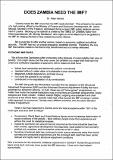| dc.contributor.author | Jesuit Centre for Theological Reflection | |
| dc.contributor.author | Dr. Henriot, Peter | |
| dc.date.accessioned | 2023-05-02T10:58:13Z | |
| dc.date.available | 2023-05-02T10:58:13Z | |
| dc.date.issued | 2000-05-30 | |
| dc.identifier.uri | https://hdl.handle.net/20.500.14274/1778 | |
| dc.description | The IMF along with the World Bank has been the key designer of the Structural Adjustment Programme (SAP) and the Enhanced Structural Adjustment Facility that have governed our economic reforms. In truth, these are not "home grown" programmes, no matter how loudly the outside institutions may cry that they are Zambian programmes, locally designed and freely chosen. Indeed, Joseph Stieglitz, outgoing vice-president and chief economist at the World Bank, recently noted that critics accuse the IMF of using a "cookie cutter approach to economics," forcing many different countries into the same standard models of adjustment. | en |
| dc.description.abstract | "Zambia needs the IMF more than the IMF needs Zambia!" This at least is the opinion of a high-ranking official in the Ministry of Finance and Economic Development, Mr. James Mtonga, Secretary of the Treasury, expressed during a recent IMF public relations seminar held in Lusaka. Backing up his opinion is a letter to the TIMES OF ZAMBIA Editor from Kitwe businessman, Mr. Murray Sanderson, who urges us not to attack but to be grateful to the IMF for obliging Zambia to face needed economic reforms. | en |
| dc.description.sponsorship | Irish Aid and Joint Country Programme | en |
| dc.language.iso | en | en |
| dc.publisher | Jesuit Centre for Theological Reflection | en |
| dc.rights | Attribution-ShareAlike 3.0 United States | * |
| dc.rights.uri | http://creativecommons.org/licenses/by-sa/3.0/us/ | * |
| dc.subject | May 2000 | en |
| dc.subject | Case Study | en |
| dc.subject | IMF | en |
| dc.title | May 2000 Does Zambia Need the IMF: A Case Study of Zambia | en |
| dc.type | Case Study | en |

